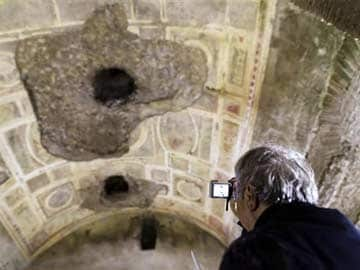
A journalist scans the frescoed ceilings of a room during a visit organised for the media of the Roman Emperor Nero's Golden Palace 'Domus Aurea' in Rome, Wednesday, June 18, 2014.
Rome:
Experts say they've discovered how to rescue Nero's underground Golden Palace from further decay and eventually reopen the ruins of the ancient emperor's entertainment complex to the public: uproot the trees in the park above it.
Archaeologists and restoration experts said on Wednesday that research, including digital simulations, aimed at solving the Domus Aurea's chronic humidity problems indicates that removing the trees will help prevent further damage. Currently tree roots and rainwater sink into the walls, damaging frescoes and causing parts of the ceiling to fall off.
"It's a radical choice, but we have to do it," said Fedora Filippi, director of the restoration effort. "It's either the roots or the Golden Palace."
She said flowers, which have less-invasive roots, could be planted after the trees are removed.
Also being developed is a system to expel humid air, as well as a three-layer drainage structure to prevent water infiltration.
The nearly 2,000-year-old structure under the Oppian Hill was opened with much fanfare in 1999 after being closed for nearly two decades for fear of collapse. Visitors could explore Nero's pleasure-playground, including the maze of passageways lined with frescoes that had inspired many Renaissance artists some 500 years ago.
But persistent structural problems continued to threaten the ceilings. The palace has remained closed since 2010 after a huge chunk of its vaulted ceiling collapsed.
Budget-strapped Italy hopes that a new law giving generous tax breaks to those funding restorations will help pay for at least some of the 31 million-euro ($42 million) project.
Archaeologists and restoration experts said on Wednesday that research, including digital simulations, aimed at solving the Domus Aurea's chronic humidity problems indicates that removing the trees will help prevent further damage. Currently tree roots and rainwater sink into the walls, damaging frescoes and causing parts of the ceiling to fall off.
"It's a radical choice, but we have to do it," said Fedora Filippi, director of the restoration effort. "It's either the roots or the Golden Palace."
She said flowers, which have less-invasive roots, could be planted after the trees are removed.
Also being developed is a system to expel humid air, as well as a three-layer drainage structure to prevent water infiltration.
The nearly 2,000-year-old structure under the Oppian Hill was opened with much fanfare in 1999 after being closed for nearly two decades for fear of collapse. Visitors could explore Nero's pleasure-playground, including the maze of passageways lined with frescoes that had inspired many Renaissance artists some 500 years ago.
But persistent structural problems continued to threaten the ceilings. The palace has remained closed since 2010 after a huge chunk of its vaulted ceiling collapsed.
Budget-strapped Italy hopes that a new law giving generous tax breaks to those funding restorations will help pay for at least some of the 31 million-euro ($42 million) project.
Track Latest News Live on NDTV.com and get news updates from India and around the world

